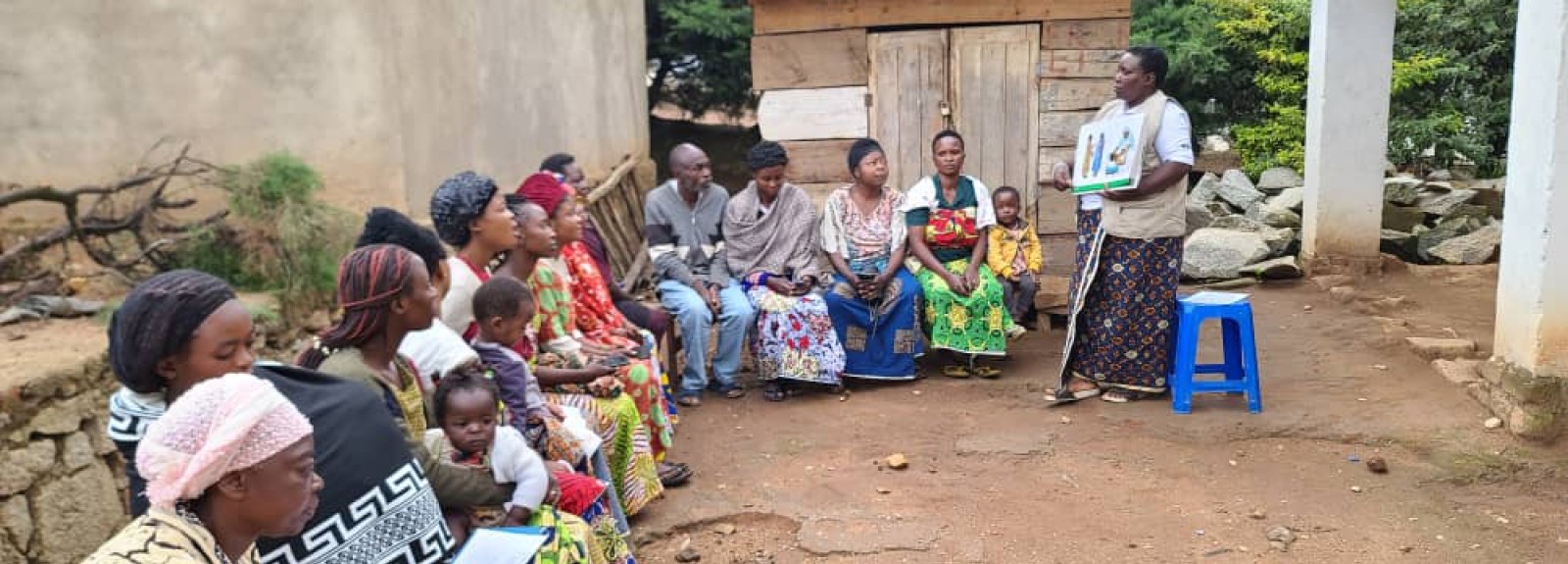The Democratic Republic of the Congo (DRC) is facing one of the world's most severe hunger crises, affecting about 23.4 million people. Supply chain disruptions caused by the COVID-19 pandemic and the war in Ukraine exacerbate this situation in shock-prone provinces such as North Kivu.
In response, the resilient mothers of the DRC are stepping forward. Through MOMENTUM Integrated Health Resilience, funded by the U.S. Agency for International Development (USAID) and led by Corus organization IMA World Health, “lead mothers” are trained to play a pivotal role in 460 Infant and Young Child Feeding (IYCF) support groups in collaboration with the DRC’s National Nutrition Program (PRONANUT).
A 50-year-old schoolteacher and mother of seven children, Esther Katungu, is a lead mother for the Mukuna IYCF support group in the city of Butembo. She outlines how these groups impact her community:
We are instilling good nutritional practices, including food diversification, using cooking demonstrations conducted using locally available nutrition-rich foods. We especially target pregnant women and follow up with them between meetings with household visits. One of our greatest achievements is when we sensitize and accompany an acutely malnourished pregnant woman who eventually gives birth to a healthy newborn. Living such moments is what IYCF support groups are all about.
Since 2022, MOMENTUM Integrated Health Resilience has supported lead mothers of 460 IYCF groups across North Kivu to hold over 4,300 meetings with other mothers in their communities. These meetings serve not only as platforms for screening children and pregnant and lactating women for malnutrition but also for hosting culinary demonstrations that utilize produce from kitchen gardens. Discussions at these gatherings extend to other vital family practices essential for optimal health, such as hand hygiene and voluntary family planning. MOMENTUM has also supplied these groups with mid-upper arm circumference (MUAC) tapes and illustrative “picture boxes,” to aid in the screening for acute malnutrition. Such tools can help ensure that IYCF group activities are effective and long-lasting.
Kokola Muvuyawise, a 40-year-old primary school teacher and mother of five, is a lead mother for the Kitulu IYCF support group in Butembo. She notes that:
I like to start the meeting with the motto, ‘We are what we eat.’ Thanks to MOMENTUM, we not only assist parents with malnourished children, pregnant and lactating women, and women with infants, but all of the community. We hold meetings in open spaces on a rotating basis to access many areas. I especially enjoy explaining the different situations using the picture boxes with key messages, such as good nutrition practices. I also enjoy sharing a cup of four-star porridge [a dish that mixes a special recipe of specific local nutrients such as grains, fruits, and vegetables] with children during cooking demonstrations.
Masika Kyaviro, a 39-year-old mother of four children living in the community of Maboya, describes how the IYCF group activities are important for her community and family:
My two-year-old girl, Kavuho Musavuli, was falling sick over and over again, and we were unaware of the cause. In addition, her growth appeared to slow down, her feet got swollen, and she got emaciated. Some people within the community speculated on various causes, which confused us about where to go for support. Luck came our way one day when a mother next door, who is a member of Malisho Bora [translated as the “eating well” support group, the local name for IYCF group] visited me and gave me information, which became a breakthrough for me. She started by identifying what Kavuho was suffering from; it was Bwaki, as we call malnutrition in the local language of this part of the country. She then sensitized my family to join the IYCF support group where we could learn about good feeding practices from the members.
Masika Kyaviro and her daughter Kavuho, who might have not been screened and ultimately discharged from nutrition care had the Malisho Bora IYCF support group not become involved.
Masika later learned how to prepare enriched four-star porridge from the IYCF group, which her daughter took and gradually recovered her health.
My husband and I are, respectively, a motorcycle taxi driver and a [street vendor], and are happy that we could learn how to use locally available foods to prepare nutrient-rich food for our children from the support group,” says Masika. “I am deeply thankful to our IYCF support group for having saved my child.
Masika also discussed how the Malisho Bora IYCF support group provided her with valuable guidance on establishing a kitchen garden. She plans to cultivate a carefully chosen array of vegetables to enhance and vary her family's diet, thereby improving their health and reducing the risk of malnutrition.
Between October 2022 and September 2023, lead mothers of IYCF support groups like Esther and Kokola, with the support of their community health workers, screened 199,897 children for acute malnutrition. Lead mothers and IYCF support groups play significant roles in MOMENTUM Integrated Health Resilience’s work to strengthen health resilience. This helps to mitigate economic shocks like food price inflation as well as environmental shocks that disrupt access to food and family nutrition.

